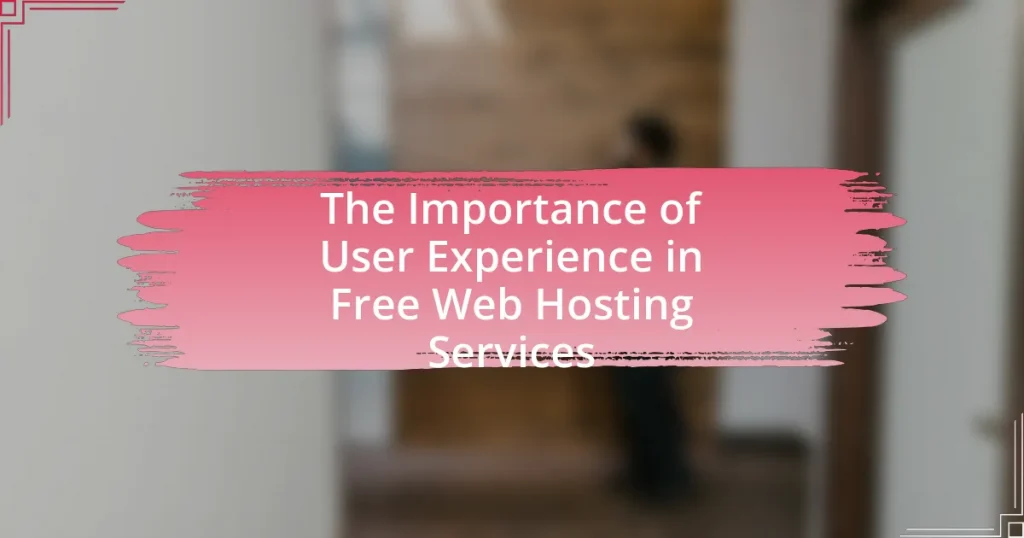The article examines the long-term viability of free web hosting for small businesses, highlighting its limitations in features, reliability, and support. It discusses how free hosting often restricts bandwidth and storage, lacks professional support, and may display ads that detract from brand credibility. While free web hosting can serve as a cost-saving measure for startups, the challenges it presents, such as security risks and inadequate customer service, undermine its sustainability for long-term business growth. The article also explores alternatives to free hosting, the benefits of paid services, and best practices for small businesses in selecting a suitable web hosting solution.

What is the Long-Term Viability of Free Web Hosting for Small Businesses?
The long-term viability of free web hosting for small businesses is generally low due to limitations in features, reliability, and support. Free web hosting often comes with restricted bandwidth, storage, and lack of professional support, which can hinder business growth and user experience. According to a 2021 survey by Clutch, 47% of small businesses reported that website performance directly impacts their revenue, indicating that unreliable hosting can lead to lost customers. Additionally, free hosting services may display ads on websites, which can detract from brand credibility. Therefore, while free web hosting may be suitable for short-term projects or personal use, it is not a sustainable solution for small businesses aiming for long-term success.
How does free web hosting work for small businesses?
Free web hosting for small businesses provides a platform to create and maintain a website without incurring hosting fees. This service typically generates revenue through advertisements displayed on the hosted sites or by offering limited features that encourage users to upgrade to paid plans. According to a 2021 survey by Clutch, 60% of small businesses utilize free web hosting as a cost-saving measure, allowing them to establish an online presence while minimizing expenses. However, the limitations of free hosting, such as bandwidth restrictions and lack of customer support, can hinder long-term growth and professional image, making it essential for small businesses to evaluate their needs as they scale.
What are the key features of free web hosting services?
Free web hosting services typically offer features such as limited storage space, bandwidth restrictions, and the presence of advertisements on hosted sites. These services often provide basic website builders and templates, allowing users to create simple websites without technical expertise. Additionally, free web hosting may include subdomain usage instead of a custom domain, which can affect branding and professionalism. Security features are usually minimal, and customer support is often limited or non-existent. According to a study by HostingAdvice, 70% of users reported dissatisfaction with the limitations of free hosting, highlighting the challenges for small businesses seeking long-term viability.
How do free web hosting platforms differ from paid options?
Free web hosting platforms differ from paid options primarily in terms of features, reliability, and support. Free hosting typically offers limited storage, bandwidth, and lacks essential features like custom domain names and advanced security measures, which are often included in paid plans. For instance, many free hosts display ads on user sites, while paid services provide ad-free experiences and better performance. Additionally, paid hosting usually includes customer support, which is often minimal or nonexistent in free options, making it challenging for small businesses to resolve issues quickly. These differences highlight the potential drawbacks of relying on free hosting for long-term business viability.
What are the potential benefits of using free web hosting?
Free web hosting offers several potential benefits, particularly for small businesses. Firstly, it eliminates hosting costs, allowing businesses to allocate their budget to other essential areas such as marketing or product development. Additionally, free web hosting services often provide easy-to-use website builders and templates, enabling users with limited technical skills to create and manage their websites effectively. Furthermore, these services can serve as a testing ground for new ideas or projects without financial risk, allowing businesses to gauge interest before committing to paid hosting solutions. According to a survey by Clutch, 30% of small businesses utilize free web hosting to minimize expenses while establishing their online presence.
How can free web hosting reduce initial costs for small businesses?
Free web hosting can significantly reduce initial costs for small businesses by eliminating the need for upfront investment in hosting services. This allows businesses to allocate their limited financial resources to other critical areas such as marketing, product development, or operational expenses. According to a survey by Clutch, 30% of small businesses reported that cost is a primary factor in their decision-making process for web hosting. By utilizing free hosting options, small businesses can maintain an online presence without incurring monthly fees, which can range from $5 to $50 or more for paid services. This cost-saving measure is particularly beneficial for startups and entrepreneurs who are often operating on tight budgets.
What advantages does free web hosting offer for startups?
Free web hosting offers startups cost savings, allowing them to allocate resources to other critical areas of their business. By eliminating hosting fees, startups can invest in marketing, product development, or customer service, which are essential for growth. Additionally, free web hosting often provides essential features such as website builders and templates, enabling startups to establish an online presence quickly and without technical expertise. According to a survey by Clutch, 30% of small businesses reported that cost is the primary factor in choosing a web hosting service, highlighting the importance of affordability for startups.
What challenges do small businesses face with free web hosting?
Small businesses face several challenges with free web hosting, primarily including limited resources, lack of customer support, and potential security risks. Limited resources often manifest as restricted bandwidth and storage, which can hinder website performance and scalability. Additionally, the absence of reliable customer support can leave small businesses without assistance during critical issues, impacting their online presence. Security risks are also prevalent, as free hosting services may not provide adequate protection against cyber threats, making small businesses vulnerable to data breaches and loss of customer trust. These challenges collectively undermine the long-term viability of free web hosting for small businesses.
What limitations are commonly associated with free web hosting services?
Free web hosting services commonly have limitations such as restricted storage space, limited bandwidth, lack of customer support, and the presence of advertisements. These constraints can hinder a small business’s online presence and growth. For instance, many free hosting providers offer only a few hundred megabytes of storage, which is insufficient for businesses that require more space for their content and files. Additionally, bandwidth limitations can lead to slow loading times or downtime during high traffic periods, negatively impacting user experience. Furthermore, the absence of reliable customer support can leave businesses without assistance during critical issues. Lastly, advertisements placed by the hosting provider can detract from a business’s branding and professionalism, making it less appealing to potential customers.
How can security concerns impact the viability of free web hosting?
Security concerns significantly impact the viability of free web hosting by exposing users to risks such as data breaches, malware infections, and lack of support. Free web hosting services often have limited security measures, making them attractive targets for cybercriminals. For instance, a study by the Ponemon Institute found that 60% of small businesses that experienced a data breach went out of business within six months. This statistic underscores the critical nature of security in maintaining operational continuity for small businesses relying on free hosting. Additionally, the absence of regular updates and security patches in free hosting environments can lead to vulnerabilities that compromise sensitive information, further diminishing their long-term viability.
How does the long-term sustainability of free web hosting affect small businesses?
The long-term sustainability of free web hosting negatively affects small businesses by limiting their growth potential and reliability. Free web hosting often comes with restrictions such as bandwidth limits, lack of customer support, and potential downtime, which can hinder a small business’s online presence. According to a study by the Small Business Administration, 70% of small businesses that rely on free hosting experience issues that impact their ability to attract and retain customers. Additionally, free hosting services may monetize through ads, detracting from the professional image that small businesses strive to maintain. This combination of limitations can lead to decreased customer trust and ultimately affect revenue generation.
What factors contribute to the longevity of free web hosting services?
The longevity of free web hosting services is primarily influenced by their ability to generate revenue through advertisements and upselling premium services. These services often rely on ad placements to monetize their platforms, which allows them to sustain operations without charging users. Additionally, the provision of basic features at no cost attracts a large user base, creating opportunities for upselling advanced features or services, thereby ensuring financial viability. For instance, companies like WordPress.com and Wix have successfully maintained their free hosting options while offering premium plans that enhance user experience and functionality, demonstrating a sustainable business model that supports their longevity.
How can small businesses assess the reliability of free web hosting providers?
Small businesses can assess the reliability of free web hosting providers by evaluating uptime guarantees, customer reviews, and the provider’s support options. Uptime guarantees indicate the expected availability of the service; reputable providers typically offer at least 99.9% uptime. Customer reviews on platforms like Trustpilot or G2 provide insights into user experiences, highlighting issues such as downtime or poor customer service. Additionally, assessing the availability and responsiveness of customer support, including live chat or email options, can indicate how well the provider will assist during technical difficulties. These factors collectively help small businesses determine the reliability of free web hosting services.

What alternatives exist to free web hosting for small businesses?
Small businesses can consider several alternatives to free web hosting, including paid shared hosting, virtual private servers (VPS), cloud hosting, and dedicated hosting. Paid shared hosting offers a cost-effective solution with better performance and support compared to free options, typically starting around $3 to $10 per month. VPS hosting provides more resources and control, suitable for growing businesses, with prices ranging from $20 to $100 monthly. Cloud hosting allows for scalability and flexibility, charging based on usage, which can be beneficial for businesses with fluctuating traffic. Dedicated hosting offers maximum performance and security, ideal for larger businesses, with costs generally starting at $80 per month. These alternatives provide enhanced reliability, customer support, and features that free hosting services often lack, making them more viable for long-term business needs.
How do paid web hosting services compare to free options?
Paid web hosting services offer greater reliability, performance, and support compared to free options. Free web hosting often comes with limitations such as slower loading times, restricted bandwidth, and lack of customer support, which can hinder a small business’s online presence. In contrast, paid services typically provide dedicated resources, enhanced security features, and 24/7 technical support, ensuring that websites remain operational and secure. According to a study by HostingAdvice, 70% of businesses that switched from free to paid hosting reported improved website performance and user experience, highlighting the significant advantages of investing in paid web hosting for long-term success.
What are the cost implications of switching from free to paid hosting?
Switching from free to paid hosting incurs direct costs, typically ranging from $5 to $500 per month, depending on the hosting provider and plan features. Paid hosting often includes benefits such as increased storage, bandwidth, enhanced security, and customer support, which can lead to improved website performance and reliability. For example, a study by HostingAdvice found that 70% of businesses experience better uptime and faster load times with paid hosting, which can positively impact user experience and conversion rates. Additionally, investing in paid hosting can reduce the risk of downtime and data loss, which are common issues with free hosting services.
What additional features do paid hosting services provide?
Paid hosting services provide additional features such as enhanced security, dedicated customer support, and increased storage capacity. These services often include SSL certificates for secure data transmission, regular backups to prevent data loss, and scalability options to accommodate growing business needs. For instance, a study by HostingAdvice found that 70% of paid hosting users reported improved website performance and reliability compared to free hosting options, highlighting the tangible benefits of investing in paid services.
What hybrid solutions can small businesses consider?
Small businesses can consider hybrid solutions such as combining free web hosting with paid services for enhanced features and reliability. This approach allows businesses to leverage the cost-effectiveness of free hosting while integrating paid options for critical functionalities like custom domains, increased storage, and better customer support. For instance, a small business might use a free hosting platform for initial website setup and then upgrade to a paid plan for e-commerce capabilities as their needs grow. This strategy is supported by the fact that many successful small businesses start with free hosting and transition to paid services as they scale, ensuring they maintain a professional online presence without incurring high initial costs.
How can small businesses leverage both free and paid hosting options?
Small businesses can leverage both free and paid hosting options by using free hosting for initial website development and testing, while transitioning to paid hosting for enhanced performance and reliability as they grow. Free hosting allows small businesses to minimize upfront costs and experiment with their online presence, but it often comes with limitations such as bandwidth restrictions and lack of customer support. In contrast, paid hosting offers greater storage, better security, and professional support, which are crucial for scaling operations and maintaining a professional image. According to a 2021 survey by Clutch, 60% of small businesses reported that investing in paid hosting improved their website’s performance and user experience, validating the importance of this transition for long-term viability.
What are the benefits of using a freemium model for web hosting?
The benefits of using a freemium model for web hosting include attracting a larger user base, providing a low barrier to entry, and creating opportunities for upselling premium services. By offering basic hosting services for free, companies can entice small businesses to try their platform without financial commitment, which can lead to increased adoption rates. According to a study by the Harvard Business Review, freemium models can convert up to 5% of free users into paying customers, demonstrating the potential for revenue generation. Additionally, the freemium model allows web hosting providers to gather user data and feedback, which can be used to improve services and tailor offerings to meet customer needs more effectively.

What best practices should small businesses follow when choosing web hosting?
Small businesses should prioritize reliability, scalability, and customer support when choosing web hosting. Reliability ensures that the website remains accessible, which is crucial for maintaining customer trust; for instance, a hosting provider with a 99.9% uptime guarantee minimizes downtime. Scalability allows businesses to grow without needing to switch providers; many reputable hosts offer plans that can easily accommodate increased traffic. Additionally, robust customer support is essential, as prompt assistance can resolve issues quickly, preventing potential revenue loss. According to a survey by Clutch, 66% of small businesses consider customer support a critical factor in their hosting decision.
How can small businesses evaluate their web hosting needs?
Small businesses can evaluate their web hosting needs by assessing their website requirements, including expected traffic, storage capacity, and specific functionalities. They should analyze their current and future growth projections to determine the necessary bandwidth and scalability options. Additionally, businesses must consider the level of technical support required, security features, and the types of content they plan to host, such as e-commerce or multimedia. Research indicates that 70% of small businesses experience growth in online traffic, emphasizing the importance of selecting a hosting plan that can accommodate increased demand.
What criteria should be considered when selecting a web hosting provider?
When selecting a web hosting provider, consider reliability, performance, customer support, pricing, and scalability. Reliability ensures that your website remains accessible, with uptime guarantees typically above 99.9%. Performance relates to server speed and response times, which can significantly impact user experience; for instance, a delay of just one second can reduce conversions by 7%. Customer support is crucial for resolving issues quickly, with 24/7 availability being a standard expectation. Pricing should align with your budget while offering value; many providers offer tiered plans that can accommodate growth. Lastly, scalability allows your hosting solution to grow with your business, ensuring that as traffic increases, your hosting can adapt without significant downtime or migration challenges.
How can businesses ensure they choose a scalable hosting solution?
Businesses can ensure they choose a scalable hosting solution by evaluating the provider’s ability to accommodate growth in traffic and resource needs. This involves assessing the hosting plan’s flexibility, such as the ease of upgrading resources like bandwidth, storage, and processing power without significant downtime or cost. Additionally, businesses should consider the provider’s infrastructure, including cloud-based options that allow for dynamic scaling based on demand. Research indicates that 70% of businesses experience increased traffic during peak times, highlighting the necessity for scalable solutions that can adapt accordingly.
What tips can help small businesses maximize their web hosting experience?
Small businesses can maximize their web hosting experience by selecting a reliable hosting provider that offers scalability, security, and customer support. Choosing a provider with a proven track record, such as those with high uptime percentages (ideally above 99.9%), ensures that websites remain accessible to customers. Additionally, utilizing features like content delivery networks (CDNs) can enhance website speed and performance, which is crucial for user experience and search engine rankings.
Investing in regular backups and security measures, such as SSL certificates, protects business data and builds customer trust. Furthermore, leveraging analytics tools provided by hosting services can help businesses understand their website traffic and optimize content accordingly. According to a study by HostingAdvice, 70% of small businesses reported that a reliable hosting service positively impacted their online presence, highlighting the importance of these strategies.
How can small businesses optimize their website performance on free hosting?
Small businesses can optimize their website performance on free hosting by implementing efficient coding practices, utilizing content delivery networks (CDNs), and minimizing resource-heavy elements. Efficient coding reduces load times and enhances user experience, while CDNs distribute content globally, decreasing latency. Additionally, minimizing images and scripts can significantly improve performance, as studies show that a 1-second delay in page load time can lead to a 7% reduction in conversions. By focusing on these strategies, small businesses can enhance their website’s speed and reliability, even on free hosting platforms.
What common pitfalls should small businesses avoid with free web hosting?
Small businesses should avoid several common pitfalls when using free web hosting, including limited storage and bandwidth, lack of customer support, and potential security vulnerabilities. Limited storage and bandwidth can hinder website performance and user experience, as many free hosting services impose strict limits that may not accommodate growing traffic or content needs. Additionally, the absence of reliable customer support can leave businesses without assistance during critical issues, impacting their online presence. Security vulnerabilities are also a significant concern, as free hosting providers may not offer adequate protection against cyber threats, putting sensitive business data at risk. These factors can ultimately affect the long-term viability of a small business’s online operations.















